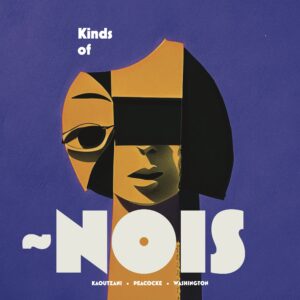[ad_1]
Sorts of ~Nois
~Nois, Sorts of Kings
Shiny Shiny Issues
The Shiny Shiny Issues recording Sorts of ~Nois is the results of a six-year lengthy collaboration between the saxophone quartet ~Nois (Julian Velasco, soprano; Hunter Bockes, alto; Jordan Lulloff, tenor; János Csontos, baritone) and the composer collective Sorts of Kings (Shelley Washington, Maria Kaoutzani, and Gemma Peacocke). The recorded works are usually in a complexly post-minimal fashion, however every composer has their very own distinctive voice. ~Nois’s wealthy ensemble tone and dexterous rhythms serve the music fairly nicely. One can readily hear that quite a lot of preparation was put into Sorts of ~Nois, because the performances are note-perfect and assuredly interpreted.
Peacocke’s Hazel begins the recording. A sluggish introduction of polychords is succeeded by mercurial ostinatos that ricochet between elements. The harmonies are equally quixotic, with shifting tonalities and glissandos distressing their framework. Chordal passages, culminating in rapidly repeating verticals, descending glissandos, and a boisterous bass-line. That is in the end offset by a brand new theme within the alto and soprano saxophones. A smoky sluggish part creates a mysterious interlude, solely to have the fast-paced ostinatos from earlier return and morph right into a syncopated groove.
Everlasting Current, by Washington, is solid in two actions: I. Now; II. At all times. The primary motion has a mournful solid, with a plaintive melody and repeating sections of equally doleful verticals. The second motion is sprightly, with brief phrases of minor key ostinatos and duets alternating between the higher and decrease cohorts of the saxophone quartet. The ostinatos regularly construct right into a spiderweb of overlapping strains. That is minimize into swaths of fabric interrupted by rests with mushy oscillating thirds within the higher voices and a bellicose bass melody. A chorale of repeated chords, adopted by the opening passagework, regularly builds right into a mass of overlapping gestures performed forte, with shocking harmonic shifts interrupted by a number of pregnant pauses.
Kaoutzani’s Rely Me In is a vigorous exercise for the quartet that begins with stentorian repetitions which are then changed by a softer part of the identical. Angular duets seem, solely to be supplanted by a martial headlong passage of staccato rhythms. Octaves and overtones arrive in a slower tempo, positioned within the foreground, however are quickly rejected by a speedy agitato rejoinder. The sluggish music returns with a wispy melody winding its method by varied registers, making a supple denouement.
Watson is just not solely an completed composer, she can be a baritone saxophonist. Csontos is joined by Watson on her baritone saxophone duo piece BIG TALK, a piece excoriating rape tradition. It begins with a spoken phrase “Opening Poem,” adopted by growling overtones, squalling excessive notes, and dissonant counterpoint in a quick groove. Octave oscillations, tough low notes, and brawny repetitions are added to the combination. There, there may be an interlude with slowly dovetailing strains and a microtonal devolvement of a unison. Howling ascents create a visceral impact, as do altissimo shrieks. That is succeeded by a fast polyrhythmic duet within the low register, aggressive in demeanor. Repeated unisons are regularly changed by advanced overlaps of imitative strains. The duo provides noise to inexorable repetitions. As soon as once more, there’s a set of polyrhythms, this time a heterophonic unison melody. Two-voice counterpoint speeds in direction of repeated notes, unisons which are then distressed with dissonant seconds. A melody is overlaid within the high voice and a brand new ostinato, wide-ranging with sepulchral bass notes, articulates the phrase construction. An abrupt shut slams the door on this violent piece that gives commentary that even eloquent texts about rape tradition won’t.
Shore to Shore by Kaoutzani is probably the most adventurous piece, with multiphonics and fluttering trills adorning the primary part’s slow-moving, lyrical atmosphere. Stacked canons are then unfurled to create an animated, contrapuntal coda. Peacocke’s Dwalm ends the recording with a polytempo tour during which sluggish drones and chords are juxtaposed in opposition to repeated notes and rapidly transferring ostinatos. As these elapse, the quartet drops into synced motoric passages. The coda brings in a gorgeous new melody that when once more is deconstructed in overlapping style, adopted by repeating octaves that pulse till a sudden last vertical. Dwalm’s digressive character is a fetching method to retaining minimal parts whereas nonetheless that includes a component of shock. A wonderful nearer to Sorts of ~Nois: a recording that’s extremely beneficial.
-Christian Carey
[ad_2]
